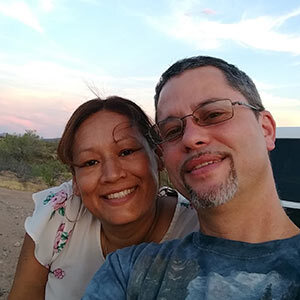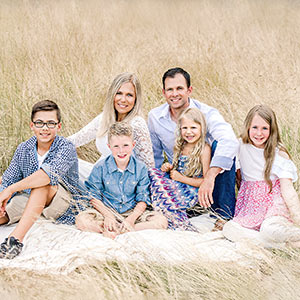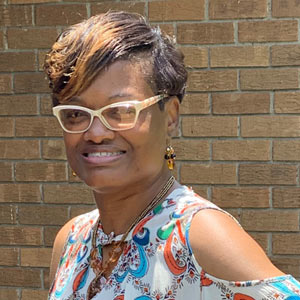Kidney Failure Is No Match for This Family

Teresa Rodriguez was relieved, at least for the moment. It was August 2018 and the results of her mammography showed that a lump in her right breast had disappeared completely, casting aside fears of cancer. Just to be safe, however, her doctors did a full set of labs.
When the phone rang the next day, it was her primary care physician calling to say she should get to the emergency room—as fast as possible. Her kidney function was almost nonexistent; down to five percent.
“The ER doctor said, ‘I don’t understand how you’re standing here acting completely normal. You literally should be on your death bed right now,’” Teresa recalls. “Then he paused and said, ‘Do you realize what I’m telling you?’”
It was difficult for Teresa to grasp how serious her situation was, given that she didn’t feel sick and there wasn’t (and still isn’t) a clear explanation for her kidney failure. But there was another reason she wasn’t as overwhelmed as one might expect.
For Teresa and her family this wouldn’t be the first time a medical evaluation would alter their way of living. Several years prior, at age six, Teresa’s younger son Trevor was diagnosed with adrenoleukodystrophy—a rare, often fatal, disease that causes severe mental and physical disabilities that get progressively worse with time.
Trevor beat the odds and is now 18 years old. Though completely reliant on others for his day-to-day needs, he can still hear and understand conversations, and enjoys when his family “talks smack” and tells stories from his past. He has an especially tight bond with his big brother, Kevin Jr., who trained to be a certified caregiver in order provide for Trevor as both a professional and a loving sibling.
When the phone rang the next day, it was her primary care physician calling to say she should get to the emergency room—as fast as possible. Her kidney function was almost nonexistent; down to five percent.
“The ER doctor said, ‘I don’t understand how you’re standing here acting completely normal. You literally should be on your death bed right now,’” Teresa recalls. “Then he paused and said, ‘Do you realize what I’m telling you?’”
It was difficult for Teresa to grasp how serious her situation was, given that she didn’t feel sick and there wasn’t (and still isn’t) a clear explanation for her kidney failure. But there was another reason she wasn’t as overwhelmed as one might expect.
For Teresa and her family this wouldn’t be the first time a medical evaluation would alter their way of living. Several years prior, at age six, Teresa’s younger son Trevor was diagnosed with adrenoleukodystrophy—a rare, often fatal, disease that causes severe mental and physical disabilities that get progressively worse with time.
Trevor beat the odds and is now 18 years old. Though completely reliant on others for his day-to-day needs, he can still hear and understand conversations, and enjoys when his family “talks smack” and tells stories from his past. He has an especially tight bond with his big brother, Kevin Jr., who trained to be a certified caregiver in order provide for Trevor as both a professional and a loving sibling.
Learning the Ropes—Home Dialysis Therapy
That caring instinct apparently runs in the family. About a month after Teresa’s kidneys failed and she decided to try home hemodialysis (HHD), her husband, Kevin Sr., was right there by her side to learn all the steps required to be her care partner.
“Because I’m so independent he’s mostly just here watching me,” she says with a laugh. “But he still helps me snap and tap (a method of jiggling and tapping the lines on a dialysis machine to clear the air out at the start of a treatment) because that’s his job. He’s here to support me. Because of Trevor, we’re so used to doing stuff like this. Learning HHD wasn’t really a big shocker for either of us.”
Just as they all adjusted to Trevor’s healthcare needs, the family has stepped up to “take care of mom” and make sure she has everything required for success. For her part, Teresa says she loves how she feels on HHD, and that the independence of doing therapy at home—on her own schedule—made it easier to accept having kidney disease.
“I think I got instant gratification from HHD,” she says. “Right away I was like, ‘What? I can have my whole day and run therapy whenever I want? I have plans tonight and can run this morning instead?!’”
“Because I’m so independent he’s mostly just here watching me,” she says with a laugh. “But he still helps me snap and tap (a method of jiggling and tapping the lines on a dialysis machine to clear the air out at the start of a treatment) because that’s his job. He’s here to support me. Because of Trevor, we’re so used to doing stuff like this. Learning HHD wasn’t really a big shocker for either of us.”
Just as they all adjusted to Trevor’s healthcare needs, the family has stepped up to “take care of mom” and make sure she has everything required for success. For her part, Teresa says she loves how she feels on HHD, and that the independence of doing therapy at home—on her own schedule—made it easier to accept having kidney disease.
“I think I got instant gratification from HHD,” she says. “Right away I was like, ‘What? I can have my whole day and run therapy whenever I want? I have plans tonight and can run this morning instead?!’”
Setting up Camp—Traveling on Dialysis
Another reason HHD agrees with Teresa is it allows her to travel. She is even able to bring her dialysis machine with her when the family goes camping.
“We LOVE camping—that’s our vacation!” says Teresa enthusiastically. “And we like to tent camp. Yeah, an RV would be a luxury, but we love to set up the tent and set up the site. We just love the outdoors.”
When asked how her family of four—with all their health needs and machines—can take on such a challenge, she explains that they own a very large 3-room tent and a “generator that’s enough to light up a whole house.” One room of the tent is designated solely for dialysis and the rest is large enough for their other activities and necessities.
Teresa says her care team at Fresenius Kidney Care Westgate Home in Glendale, Arizona has helped her learn the ins and outs of traveling with dialysis equipment and finding a therapy schedule that works for her and her lifestyle – wherever and whenever she needs to dialyze.
“They’re my homies,” says Teresa of her care team. “They cater to your needs. They’re just so open minded with me. They just listen.”
“We LOVE camping—that’s our vacation!” says Teresa enthusiastically. “And we like to tent camp. Yeah, an RV would be a luxury, but we love to set up the tent and set up the site. We just love the outdoors.”
When asked how her family of four—with all their health needs and machines—can take on such a challenge, she explains that they own a very large 3-room tent and a “generator that’s enough to light up a whole house.” One room of the tent is designated solely for dialysis and the rest is large enough for their other activities and necessities.
Teresa says her care team at Fresenius Kidney Care Westgate Home in Glendale, Arizona has helped her learn the ins and outs of traveling with dialysis equipment and finding a therapy schedule that works for her and her lifestyle – wherever and whenever she needs to dialyze.
“They’re my homies,” says Teresa of her care team. “They cater to your needs. They’re just so open minded with me. They just listen.”
Looking Forward—Preparing for a Kidney Transplant
As Teresa prepares for the next step in her journey, she is thankful for the guidance she receives and the relationships she has made at Westgate.
“I’ve had the same nurse since day one,” she notes. “When you’re spending that much time together, whether training or just working things out, all you can do is sit and talk about life. You just naturally get closer to people.”
Presently, Teresa and her care team are focused on one thing for her—a kidney transplant. And Teresa is doing everything she can to make it happen—from getting all the necessary tests and maintaining a healthy diet, to a surgery to repair her heart. In the meantime, she’s living her best life, with full support from “the Kevins,” and looking to help others who need hope or advice concerning kidney disease.
“I know God is putting me though this for a reason,” she says. “This is my opportunity to learn about this and I’m going to help somebody with their situation someday. I believe in my heart that someday I’m going to help someone understand and know that dialysis isn’t the end of the world.”
“I’ve had the same nurse since day one,” she notes. “When you’re spending that much time together, whether training or just working things out, all you can do is sit and talk about life. You just naturally get closer to people.”
Presently, Teresa and her care team are focused on one thing for her—a kidney transplant. And Teresa is doing everything she can to make it happen—from getting all the necessary tests and maintaining a healthy diet, to a surgery to repair her heart. In the meantime, she’s living her best life, with full support from “the Kevins,” and looking to help others who need hope or advice concerning kidney disease.
“I know God is putting me though this for a reason,” she says. “This is my opportunity to learn about this and I’m going to help somebody with their situation someday. I believe in my heart that someday I’m going to help someone understand and know that dialysis isn’t the end of the world.”
Suggested topics

Family, Faith, Friends, and a Generous Stranger: How Melanie Stoddard Got the “Spring” Back in Her Step
As a busy wife and mother of four, Melanie Stoddard cares for her kids and household, handles the many duties of homeschooling, sings with...
Pregnancy and Motherhood with Kidney Disease
Not long ago, many patients—and even doctors—would have considered it an impossible dream for a woman to become pregnant...

Home Dialysis During a Breast Cancer Battle
Valarie Gates Totten is as tough as they come. When she was diagnosed with breast cancer in 2010, Valarie had already been on...
